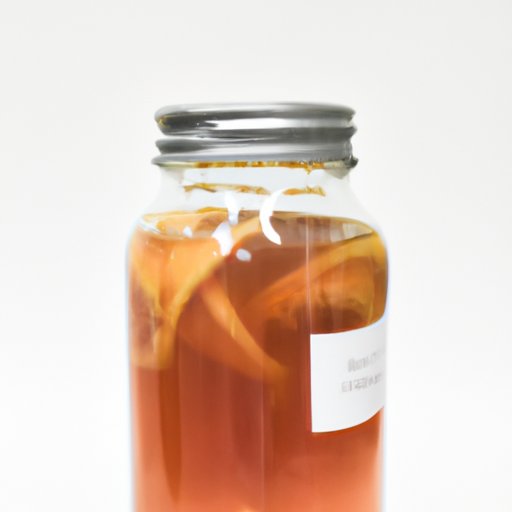I. Introduction
Kombucha has been gaining popularity as a health drink in recent years. This fermented tea beverage is not only delicious but also packed with beneficial microbes. In this article, we will explore the science behind kombucha and its potential health benefits, including improving gut health and mental wellness. We will also discuss how to brew your own kombucha and compare it to other probiotic beverages.
II. The Science Behind Kombucha: How Fermentation Creates a Probiotic Powerhouse
Kombucha is made by fermenting tea and sugar with a SCOBY (symbiotic culture of bacteria and yeast). During fermentation, the yeast in the SCOBY consumes the sugar and produces alcohol, which is then converted into acetic acid by bacteria. This process creates a range of beneficial microbes, such as probiotics, enzymes, and organic acids. The probiotics in kombucha aid digestion and boost immunity. The organic acids also aid in digestion and detoxification and have anti-inflammatory properties.
III. Kombucha: The Elixir of Life? Debunking health claims and exploring the benefits
Kombucha has been claimed to have many health benefits, including improving digestion, aiding weight loss, and boosting energy levels. While some of these claims have been supported by scientific studies, others remain unsupported. For instance, there is no scientific evidence that kombucha can cure cancer or reverse the aging process. However, studies have shown that kombucha has antioxidant properties and can help to detoxify the liver.
IV. The Role of Kombucha in Gut Health: Exploring the Link Between Bacteria, Digestion, and Immunity
The gut microbiome, or the population of microbes in the gut, plays a vital role in digestion, immunity, and overall health. Kombucha, as a probiotic beverage, contains live beneficial bacteria that can support a healthy gut microbiome. A healthy gut microbiome has been linked to many health benefits, including improved digestion, immunity, and neurological function.
V. DIY Guide: How to Brew Your Own Kombucha and Reap the Health Benefits
Brewing your own kombucha is affordable and easy. First, you need to obtain a SCOBY and a starter liquid. You can either buy a SCOBY or grow one at home. Then, brew black tea, add sugar, and let the tea cool. Add the SCOBY and starter liquid to the tea and let it ferment for 7-14 days. Store the finished kombucha in airtight glass containers and refrigerate. However, it’s important to follow safety guidelines and avoid contamination during home brewing.
VI. Kombucha and Mental Health: Can Drinking Fermented Tea Really Improve Your Mood and Reduce Anxiety?
Studies have shown that the gut microbiome can affect mental health and emotional regulation. It’s believed that probiotics in kombucha may affect neurotransmitter production in the gut, which could affect mood and anxiety levels. While more research is needed to confirm these health claims, many people have reported positive effects on their mental health and well-being after consuming kombucha regularly.
VII. Kombucha vs. Other Probiotic Beverages: A Comparison of Flavor, Health Benefits, and Cost
Kombucha has a unique tart, slightly sweet, and fizzy taste that many people enjoy. Compared to other probiotic beverages like kefir or yogurt, kombucha is relatively low in calories, high in antioxidants, and can be customized with different flavors. In terms of cost, brewing your own kombucha is more affordable than buying commercially produced kombucha.
VIII. The History and Culture of Kombucha: From Ancient China to Modern Superfood
Kombucha has a long history, dating back to ancient China where it was known as the “tea of immortality.” It then spread to other parts of Asia and eventually to Europe and America. In recent years, it has gained worldwide popularity as a health drink and a symbol of wellness culture. Different cultures have different names and methods of brewing kombucha, but all share a connection to this ancient beverage.
IX. Conclusion
Kombucha is a delicious and healthy drink that has been consumed for centuries. It contains a range of beneficial microbes that can improve digestion, support immunity, and potentially even benefit mental health. By understanding the science behind kombucha and its potential benefits, we can make informed decisions about our health and try brewing our own kombucha at home.
(Note: Is this article not meeting your expectations? Do you have knowledge or insights to share? Unlock new opportunities and expand your reach by joining our authors team. Click Registration to join us and share your expertise with our readers.)
